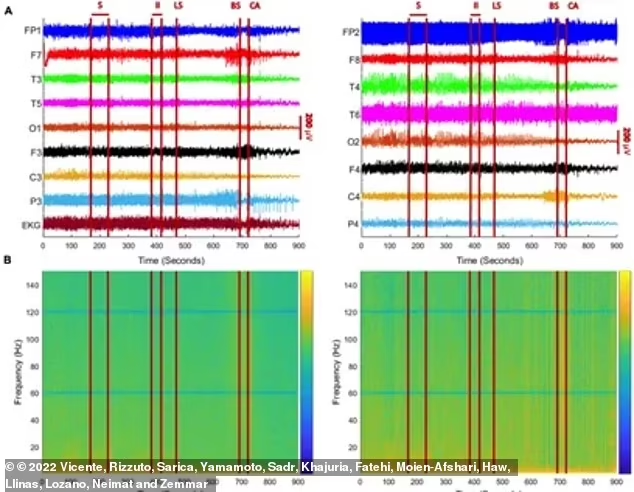Neuroscientists have recorded brain activity in a dying human for the first time, offering new insights into what happens in the moments before and after death.
According to Mail Online, the discovery was made when an 87-year-old epilepsy patient suffered cardiac arrest while undergoing treatment. The patient had an electroencephalography (EEG) device attached to monitor seizure activity, allowing researchers to capture 900 seconds of brain activity, including the crucial 30 seconds before and after his heart stopped.
The data revealed that brain regions associated with memory and recall remained active during this period. Dr. Ajmal Zemmar of the University of Louisville, Kentucky, explained, “By generating brain oscillations involved in memory retrieval, the brain may be playing a final recall of significant life events, similar to near-death experiences.”
The findings, published in Frontiers in Aging Neuroscience in 2022, challenge existing definitions of when life officially ends and raise ethical questions regarding the timing of organ donation.
Brain oscillations—repetitive electrical patterns in the brain—were observed, particularly gamma waves, which are linked to memory retrieval and high-level cognitive functions. Other oscillations, such as delta, theta, alpha, and beta, were also detected.
Dr. Zemmar speculated that rather than shutting down instantly, the brain might be biologically wired to manage the transition into death, possibly replaying key life moments. “If these brain patterns occur during memory recall, dreaming, and meditative states, it’s intriguing to think they could also allow for a final ‘life review’ before death,” he noted.
On a spiritual level, he believes these findings may provide comfort to families. “Knowing that the brain might be recalling positive memories as someone passes away could offer a sense of peace to their loved ones.”
Scientists are still uncertain why or how this life review phenomenon occurs. One theory suggests oxygen deprivation during life-threatening situations triggers a surge of neurotransmitters, leading to a rapid firing of neurons and vivid memory recall. Another possibility is that emotional memories stored in the amygdala—responsible for the fight-or-flight response—are activated in the final moments.
Dr. Zemmar emphasized that more research is needed, as this case alone cannot lead to definitive conclusions. “The brain had undergone bleeding, seizures, and swelling, making it difficult to draw broad assumptions. Larger studies are necessary to fully understand these processes.”
Beyond the scientific curiosity, the study raises profound questions: When exactly does life end? Should EEG recordings be considered alongside EKG readings to declare death? According to Dr. Zemmar, “This could open the door to a deeper discussion about defining the exact moment of death.”












